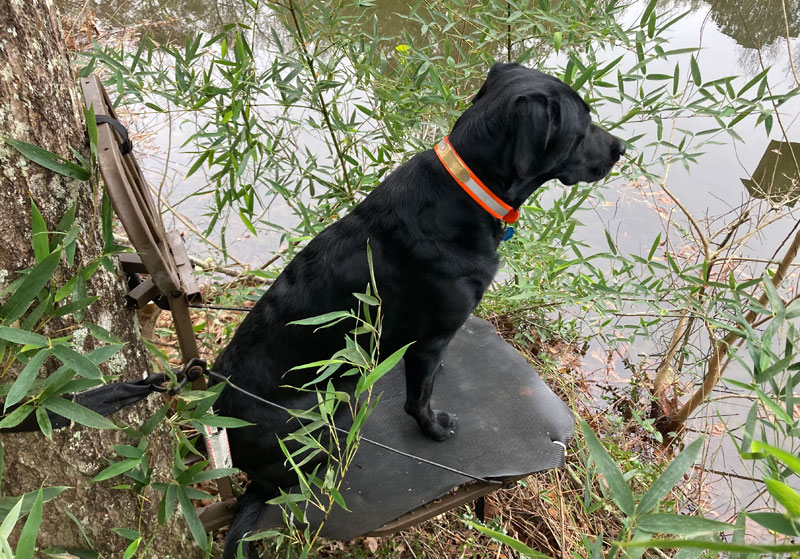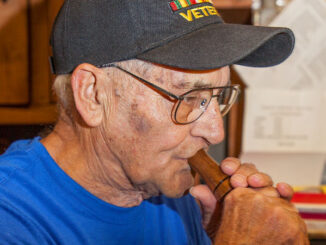
So, all of the training, drills, lessons, and if you’re like me, gray hairs, are paying off with your dog’s first hunting season. Time to get out there and put some birds on the water and cash in.
You’re eager, as is your dog, so you want to have the best start possible. Just keep in mind training differs from hunting in many ways. You can eliminate nearly all the variables in training that you can’t while hunting. Really, training is a controlled environment you’ve rigged in your favor to set the dog up for success.
You can try to do the same with hunting, but differing factors such as blind location, wind, cover and, most importantly, how the ducks work, can present some obstacles to overcome. Luckily, you can mitigate a lot of it beforehand that you might not focus on in the normal training.
Getting comfortable
Kaine Pace is owner of Down South Gundogs in St. Francisville. I’ve gotten to know and respect Pace over the years. Not only is he a great trainer, but he’s also a great duck hunter. His insights are spot on for a young dog, one that’s a little rusty or one that has some issues that need attention.
“You want to get the dog accustomed to as many things as possible before hunting,” he said. “It will be a lot easier on you and your dog if it has been taught where it will ride in the boat or UTV, its place in the blind, getting on and off a dog stand, getting through decoys on a retrieve, wearing a cold weather vest and such that it will actually face when hunting. You can get all of that out of the way before the season or brush up on it during the split or when not out hunting if needed.”
Some important things Pace and I agree on is that a young or novice dog can get overwhelmed easily.
Four hunters in a blind banging away is a far cry from training with a single gunner shooting a blank or popper. It’s a lot louder with a lot more shots with multiple birds going down. That’s a lot to process. Dogs can get skittish or too excited so it may be best to hunt with fewer people initially and work up. If you think the dog will break at the shot, don’t shoot and leash it so it can’t. You’d be better off in the long run focusing on the dog now than shooting.
Do it right
Pace put it this way: “A dog that breaks and gets corrected halfway to the bird doesn’t realize it is being corrected for breaking and if they make a habit of it or the handler lets them get away with it, it’s hard to fix.”
Breaking is also extremely dangerous to the dog and hunters alike, so focus on the dog, you’ll get plenty of shots later.
When training, the dog mostly is expecting where the mark is coming from. That won’t always be the case hunting. You want the dog concealed, but it still needs a good view, so the retrieves are easy and the confidence builds. There’s no way the dog will see all of them so help it out.
“Get out of the blind if the dog is having trouble or you anticipate it will and help it get the bird,” Pace said. “It’ll be quicker than staying in the blind and a lot less quiet than trying to direct a novice dog.”
A great drill he suggested is to throw marks while training that the dog can’t see. It teaches that birds may come from anywhere. The dog will start looking for them as well as looking in the direction of the splash or thud it heard if it didn’t see it and will carry that over when hunting and start looking for birds coming in.
Keep it exciting
To combat boredom, bring a bumper and run the drill outlined if things get slow. Dogs can get bored easily and those that haven’t hunted much aren’t used to the slow times, since training is usually quicker and busier.
“It’ll take a season or two for the dog to fully come into its own,” Pace said. “It won’t get everything right so be patient and anticipate helping so the dog learns and puts it all together. Rushing can ruin a dog with a ton of potential so think of the time and money spent so far to get the dog hunt-ready.”
I agree, there will be plenty of hunts down the road when you’ll get the “I got this, just hit the dang bird!” look. You’ll love that look, might make you shoot better too!
For more information, Pace can be reached at 225-245-2914 or at www.downsouthgundogs.com.
